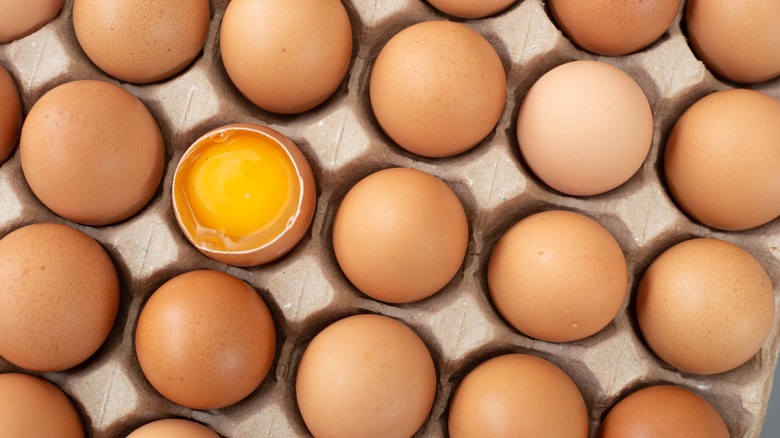What Makes Eggs The Gold Standard Of Protein
There are truly few foods as versatile as the humble egg. It can be transformed through culinary magic into a fluffy meringue or a creamy aioli, mixed into a cake for a sweet treat, or hard-boiled and pickled for a tangy, savory snack. Eggs are so easy to cook that the phrase, "Can't boil an egg," is common parlance for someone with no cooking skills whatsoever. And they're also extremely affordable. (At least, when there isn't a global egg shortage resulting in skyrocketing prices.)
Eggs are used in just about every culinary tradition around the world, and they are one of the only ingredients commonly found in breakfast, lunch, and dinner dishes. In one day, you could go from a spicy shakshuka, to an egg salad sandwich, to a bowl of ramen topped with a soft-boiled egg sprinkled with salty furikake.
... And you might want to. In addition to being tasty and efficient, eggs are also incredibly nutritious. They're even referred to as the "gold standard" of protein.
Egg nutrition facts
For such a small size and low-calorie count, eggs are packed with protein. The average egg contains 6 grams of protein, set against only 72 calories. This might not seem like a lot compared to proteins like steak or salmon, which have 31 grams and 20 grams of protein per 100-gram serving, respectively. Even taking into account the weight of an egg (around 50 grams), it might not sound like a protein bomb. But they can't be beat as a source of lean protein, with only 5 grams of fat, and plenty of antioxidants, and anti-inflammatories. They also include substances like choline, which boosts cell growth. Vitamins A and D, as well as calcium and iron, can also be found in eggs — making them a well-rounded source of nutrients.
And while concerns have been squabbled over in the past about the high cholesterol levels in eggs, eggs have been shown to not raise cholesterol levels in humans. Items like red meat are far more likely to have a negative impact on this aspect of your health.
The importance of protein
Eating enough protein is crucial to maintaining a healthy diet. The average person is recommended to eat about 44 or 55 grams of protein a day. This helps to build muscle and contributes to strong bones and good hair and skin. Eating protein is what helps you stay full for longer, and not eating enough of it can leave you feeling unsatisfied even if you've just eaten a big bowl of carbs. Protein deficiencies can also lead to frequent illness and depleted immune systems.
Luckily, an egg is what is known as a complete protein, meaning that it contains all the amino acids necessary for human survival. A couple of eggs a day can be a fantastic supplement to a diet of protein-rich vegetables, legumes, nuts, and healthy animal proteins.
This makes eggs an extremely important source of protein, especially for vegetarians and people looking to cut down on their meat consumption. They are also easier to digest than many plant-based protein sources like beans or lentils — which can cause gas and indigestion.



